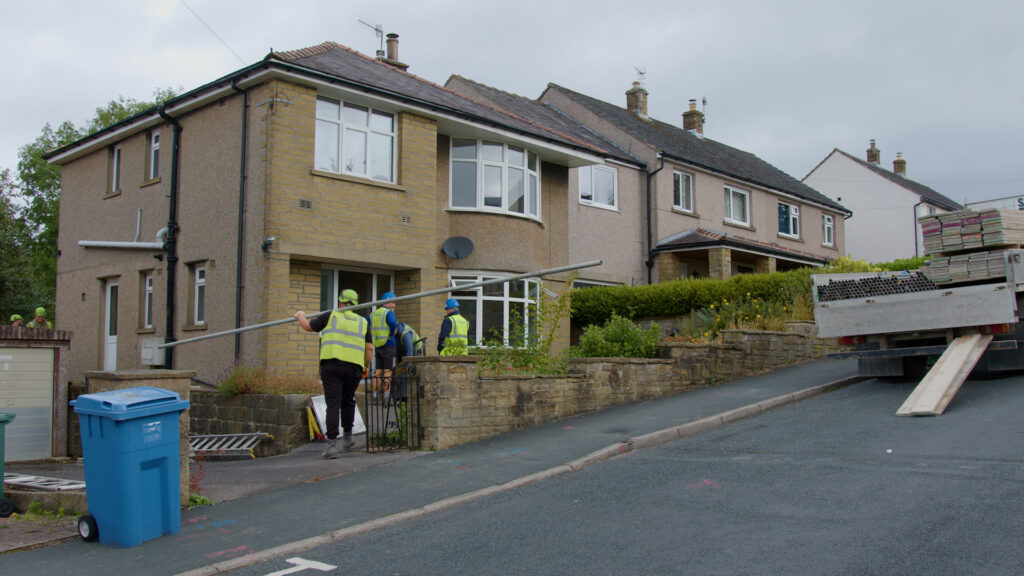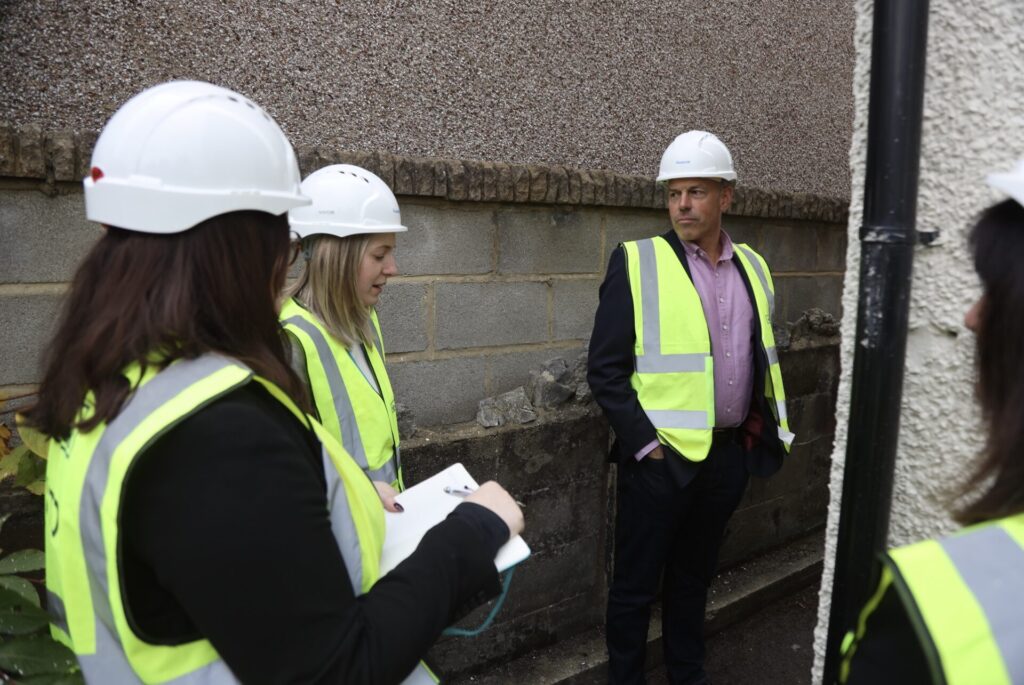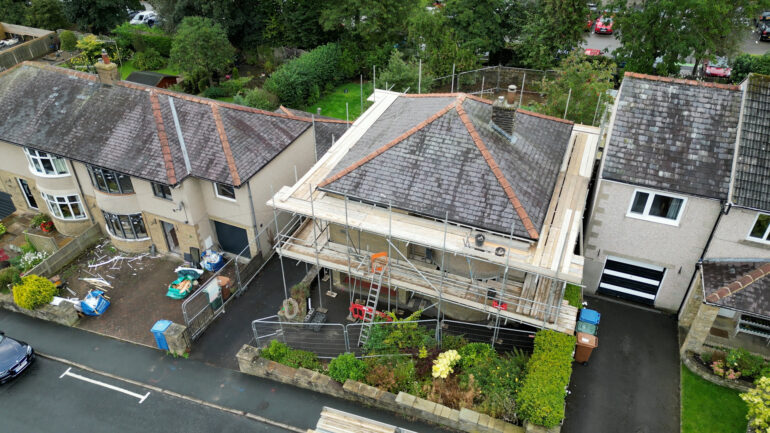In a step towards tackling the challenges of the UK’s aging housing stock, Skipton Building Society has embarked on a pioneering retrofit project at a residential interwar property.
Located just beyond the society’s main offices, on Regent Road in Skipton, the initiative aims to showcase the potential of retrofitting to reduce carbon emissions while enhancing living standards.
It also hopes to address the pressing issue of consumer awareness, providing a helpful roadmap for both lenders and borrowers alike interested in learning more about sustainable options.
Confronting retrofit challenges
The retrofit project on Regent Road is more than just a renovation – it represents a choice to confront the inefficiencies of the UK’s aging housing stock head-on.
Charlotte Harrison, CEO of Home Financing at Skipton Building Society, underscored the gravity of the issue, saying: “We know we’ve got a climate crisis on our hands, and we know we’ve got the UK net zero ambition by 2050.
“We also know that UK housing stock – our old, very leaky housing stock – is around 20 to 22% of carbon emissions.
“Enabling people to do something to that leaky housing stock is very important to us.”
Skipton’s retrofit journey began with a recognition of the barriers facing homeowners.
Harrison said: “Back in 2022 we launched our EPC Plus reports, which is a free home energy efficiency report available to all members.
“The intent was that it not only tells you where you are today, but also what your property could get to in terms of energy efficiency improvements.”
While these reports saw strong engagement, Harrison said homeowners often felt overwhelmed.
She said: “Many people were not really sure where to go for information and support, and many were concerned it is a bit costly.
“We found that people aren’t really then carrying out the retrofit themselves.”
Recognising these challenges, the society decided to lead by example.
“We were left in the situation where we felt we had to do something,” Harrison said.
“So, to help, we chose to embark on our own retrofit journey so that we can therefore design products and propositions at the end of this that are going to really be tailored for the end consumer.
“We want to meaningfully support our members and customers through that journey.”
Accessible solutions
The selected property, an interwar detached house, reflected the common challenges that many homeowners face when upgrading homes.
With an initial Energy Performance Certificate (EPC) rating of band D and a Standard Assessment Procedure (SAP) score of 58, the house symbolised the inefficiencies that contribute to high energy consumption and emissions.
Heat loss was particularly severe, with 59% escaping through uninsulated walls, compounded by poor air tightness and outdated windows.

The building’s U-values – a critical measure of heat transfer – were recorded at 1.72±0.05 W/m²K, confirming the poor thermal performance typical of solid-walled properties.
The retrofit process at Regent Road included a combination of modern, energy-efficient interventions such as enhanced insulation, air source heat pumps, and high-performance glazing.
Each element was designed to address specific inefficiencies, transforming the home into a model of improved energy efficiency and lower carbon emissions.
Harrison pointed out that the project was about more than just upgrades, but about learning.
She said: “This will help us understand ahead of time what the pain points and the blockers are in terms of carrying out a retrofit.”
By documenting the process in detail, Skipton aims to create a practical blueprint for other homeowners.
The goal was not just to improve one property but to pave the way for more accessible retrofitting solutions nationwide.
“We want to be in a position of better knowledge, to be really fact-based and data-led, so that we can provide solutions and products that are going to enable you to consider retrofit,” Harrison added.
Expert endorsements
On a recent visit to Skipton as part of the collaboration between the society and MoveIQ, Phil Spencer, property expert and television presenter, praised the project for its foresight.
“Most people don’t know where to start with retrofitting, but this initiative allows Skipton to educate members based on real-world experience.”

Spencer acknowledged the challenges, especially for older properties, but emphasised the growing appetite for sustainable upgrades, fuelled by rising energy costs and environmental awareness.
He said: “People are much more conscious today of the cost of living in a house.
“Given the costs of energy and what that has been doing over the last few years, people are more mindful of what it costs to actually live in it.”
However, the potential benefits extend beyond that of just reduced bills.
Spencer highlighted that well-executed retrofits could help improve property value, while also accelerating sales turnaround times.
He said: “It’s definitely making those homes easier, faster to sell.
“And I think at the moment that has financial value, if you can sell it in two weeks rather than three months.”
Such efforts align with the UK’s broader commitment to retrofitting 29 million homes by 2050, a task deemed essential to meeting climate goals.
Scaling up sustainability
While the Regent Road retrofit project offers a compelling example of how individual homeowners can make a meaningful impact on energy efficiency, both Harrison and Spencer stressed that broader systemic support from Government is crucial to scaling up retrofitting efforts across the UK.
The upfront costs can be a significant deterrent.
“Access to grants and making it cheaper is fundamental,” Harrison said, underscoring that without external support, many people simply cannot afford the necessary upgrades, despite the long-term savings in energy costs.
The expense of retrofitting, particularly for older properties like the Victorian house on Regent Road, is often cited as one of the primary reasons homeowners delay or forgo making energy-efficient improvements.
Harrison added: “The high expense is the primary reason many homeowners are unable to carry out energy efficiency improvements.
“If supply is increased and grant availability is made more accessible, this can help lower the overall costs.”
This sentiment echoed the broader challenge facing the industry: while retrofitting can significantly reduce energy bills and carbon emissions, the initial investment often seems out of reach for many people, especially those with limited disposable income.

Spencer also recognised the growing consumer interest in sustainable homes, but agreed with Harrison that financial constraints remain a key obstacle.
As he explains: “The Government has got a country to run, and things are quite economically tight at the moment, but we’ve also got a world to look after.”
The financial pressures on homeowners are compounded by the current economic climate, making it harder for individuals to invest in the long-term benefits of retrofitting.
However, Spencer said that as awareness continues to rise, particularly around the potential for retrofits to reduce household energy bills, we will see more people taking action – provided that the Government introduces policies and incentives to make retrofitting more financially viable.
Crucial roadmap
As Skipton Building Society’s pioneering retrofit project at Regent Road continues to unfold, it is clear that this initiative is about more than just improving the energy efficiency of a single home – it is about creating a practical, scalable model for homeowners across the UK.
The project at Regent Road, though ambitious, highlights that retrofitting does not always need to be an expensive, overwhelming process.
Harrison said: “One of the other learnings we’ve found, is yes, there can be the bigger costly items such as your heat pumps and your solar panels, but actually sometimes insulation doesn’t have to be a really costly outlay, but it can make a big difference.
“That’s why it’s really important to be able to understand, you don’t want to just assume that you need to put £15,000 worth of solar panels on your roof to move you up the EPC scale.”
The project’s lessons go beyond just technological upgrades; it is about understanding each property’s unique needs.
Harrison said: “What’s so important is that every property is different.
“The fabric of properties are different and therefore functionality or a product that you wrap around that can have a different consequence and different impacts.”
While Skipton’s retrofitting journey at Regent Road provides valuable insights for homeowners and lenders alike, Spencer was optimistic that more people will embrace retrofitting as awareness grows.
He said: “We’ll definitely see more people retrofitting their properties when there really is more heightened awareness of the reasons for doing that, both for financial and environmental reasons.
“I guess it will happen more when there are more products and more incentives.”
For now, Skipton’s commitment to leading by example offers a roadmap.
Harrison concluded: “There’s quite a lot of thought behind every detail – not everyone will be undergoing such a large scale retrofit, but we’re doing this for a full test and learn.
“The key thing is that it doesn’t have to be on such a grand scale.
“There are things that people can do that are relatively simple just to make a difference.”



